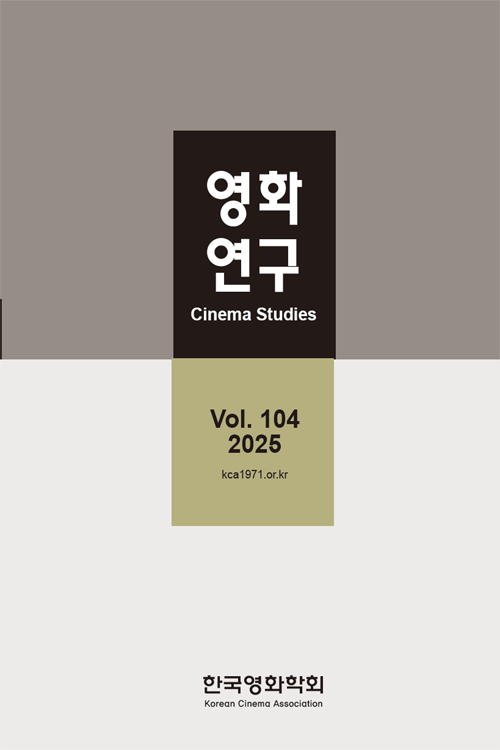- 영문명
- Representation of Police Corruption in Films: Justification and Silence as Narrative Strategies
- 발행기관
- 한국영화학회
- 저자명
- 김남미(Nam-Mi Kim)
- 간행물 정보
- 『영화연구』제104호, 35~62쪽, 전체 28쪽
- 주제분류
- 예술체육 > 예술일반
- 파일형태
- 발행일자
- 2025.06.30

국문 초록
이 연구는 한국 범죄영화 세 편, <부당거래>(2010), <경관의 피>(2022), <아수라>(2016)를 분석 대상으로 삼아, 경찰조직 내부의 부패가 영화 속에서 어떻게 정당화되고 침묵되며 제도화되는지를 서사 구조를 통해 고찰하였다. 이를 위해 도덕적 해리 이론, 조직침묵 이론, 미끄러운 경사 이론의 세 가지 해석의 관점을 설정하고, 각영화의 내러티브 전개와 인물의 윤리적 갈등, 조직 구조의 작동 방식 등을 비교·분석하였다. <부당거래>는 경찰조직의 실적 중심 문화가 수사 조작과 증거 왜곡을 조직 적으로 용인하게 되는 과정을 도덕적 해리 이론을 통해 설득력 있게 보여주며, 개인의 죄책감은 명분화와 책임 분산 전략을 통해 희석된다. <경관의 피>는 불법 수사에 대한 내부 비판이 조직의 침묵 구조에 의해 억압되고, 충성심과 생존 논리 속에서 비윤리적 실천이 정당화되는 과정을 조직침묵 이론의 관점에서 분석하였다. <아수라>는 반복된 타협과 유착이 윤리적 기준을 점차 후퇴시키고, 부패가 일상화되어 조직문화로 흡수되는 과정을 미끄러운 경사 이론을 통해 설명하였다. 이들 영화는 공통적으로 경찰조직의 부패를 단순한 개인 일탈이나 사적 탐욕이 아니라, 조직 내부의 생존전략과 권력 작동 방식이 만들어낸 구조적 현상으로 묘사하고 있다. 특히 윤리적 판단이 조직의 명분과 평가 기준에 의해 유예되거나 무력화되는 양상은, 공공조직 내 비공식 문화와 법적 규범 사이의 간극을 드러내는 중요한 시사점을 제공한다. 이 연구는 범죄영화가 단지 범죄 현실을 재현하는 수단을 넘어, 윤리 담론과 제도적 정당화 구조를 재구성하는 문화적 장치로 기능하고 있음을 강조한다.
영문 초록
This study analyzes three Korean crime films—The Unjust (2010), The Policeman’s Lineage (2022), and Asura: The City of Madness (2016)—to examine how police corruption is represented, justified, silenced, and institutionalized through narrative structures. Employing three interpretive perspectives—Moral Disengagement Theory, Organizational Silence Theory, and Slippery Slope Theory —the study investigates how each film depicts the ethical conflicts of individuals and the operational logic of corrupt organizational systems. The Unjust illustrates how performance-driven police culture leads to systemic fabrication and manipulation of investigations, where guilt is dispersed through mechanisms of moral justification and responsibility diffusion. The Policeman’s Lineage explores how dissent is suppressed within the organization and how silence becomes a strategic adaptation under institutional pressure, analyzed through the lens of organizational silence. Asura shows how repeated compromise and complicity normalize corruption, eventually integrating it into organizational culture—an arc that aligns with the slippery slope perspective. Collectively, these films portray corruption not as personal deviation or moral failure, but as a structurally reinforced and culturally legitimized phenomenon. They reveal how ethical reasoning is suspended or invalidated under the logic of survival, loyalty, and organizational utility. This study argues that crime films function not merely as representations of criminal acts, but as cultural apparatuses that construct and critique discourses of ethics, power, and institutional legitimacy.
목차
1. 서론: 영화는 왜 경찰 부패를 말하는가
2. 경찰조직 부패의 서사화와 이론적 해석 관점
3. 영화 <부당거래>에 나타난 도덕적 해리의 서사 구조
4. 영화 <경관의 피>에 나타난 조직침묵의 서사 구조
5. 영화 <아수라>에 나타난 미끄러운 경사의 서사 구조
6. 결론: 영화는 경찰조직을 어떻게 정당화 하는가
키워드
해당간행물 수록 논문
참고문헌
최근 이용한 논문
교보eBook 첫 방문을 환영 합니다!

신규가입 혜택 지급이 완료 되었습니다.
바로 사용 가능한 교보e캐시 1,000원 (유효기간 7일)
지금 바로 교보eBook의 다양한 콘텐츠를 이용해 보세요!


